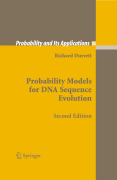
Our basic question is: Given a collection of DNA sequences, what underlying forces are responsible for the observed patterns of variability? To approach this question we introduce and analyze a number of probability models: the Wright-Fisher model, the coalescent, the infinite alleles model, and the infinite sites model. We study the complications that come from nonconstant population size, recombination, population subdivision, and three forms of natural selection: directional selection, balancing selection, and background selection. These theoretical results set the stage for the investigation of various statistical tests to detect departures from ‘neutral evolution’. The final chapter studies the evolution of whole genomes by chromosomal inversions, reciprocal translocations, and genome duplication. Throughout the book, the theory is developed in close connection with data from more than 60 experimental studies from the biology literature that illustrate the use of these results. Second edition of a successful book Genetics is one of the fastest growing areas of active research Durrett is a very well-known probabilist Assumes no previous knowledge of biology and only a basic knowledge of probability Includes data from numerous experimental studies from the biological literature INDICE: Basic models.- Estimation and hypothesis testing.- Recombination.-Population complications.- Stepping stone model.- Natural selection.- Diffusion process.- Multidimensional diffusions.- Genome rearrangement.
- ISBN: 978-0-387-78168-6
- Editorial: Springer
- Encuadernacion: Cartoné
- Páginas: 440
- Fecha Publicación: 01/07/2008
- Nº Volúmenes: 1
- Idioma: Inglés
